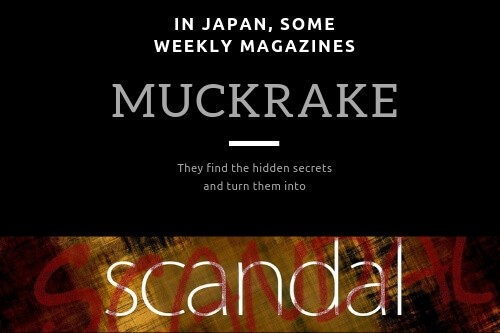
YouTube / iTunes / Spotify / Radio Public / Pocket Casts / Google Podcasts / Breaker / Overcast
Listen to ArtisanEnglish.jp posts & lesson intros here.
Word of the Day: Muckrake
The mass media is changing in Japan and starting to accept the need to muckrake.
Muckrake means to seek out scandal and print or publish it in publications or, of course, online. Everyone loves a good scandal.
When I first came here, it was almost unheard of for a newspaper to print anything about a scandal relating to politicians or famous people.
It seemed to me that there was something taboo about mentioning that a politician was an alcoholic or womanizer.
Those things were swept under the carpet and kept there.
Fortunately for readers who like a good scandal and, unfortunately for those in the public eye, muckraking has become a great way to sell magazines and papers.
Journalists were traditionally supposed to report the news.
They asked questions, received the answers and wrote their stories.
However, the media climate is crowded with online publications, and the traditional print media market is dying out.
Young people don’t buy newspapers.
Perhaps this is one reason journalists have started to muckrake or seek out scandals and print them in their publications.
No one is safe.
Violence in sumo, drug-using baseball players, TV announcers and personalities who have affairs with married people, and even famous singers who run around parks in the depth of night au naturel (It’s French for ‘in the nude.’) are all scandals which have been used to sell papers.
Yes, they all qualify as news, but they are also scandals, and these days, everyone loves a good scandal.
The word muckrake has an interesting origin.
Originally, it meant using a rake to dig up disgusting things such as dead, rotting animals and other garbage.
It took on the meaning we use today when former United States president Theodore Roosevelt, president of the early 1900s, called investigative journalists muckrakers.
So you see, muckraking has been a kind of journalism in the States for a long time, but it’s just beginning to build up a head of steam in Japan big time.
Flesch-Kincaid Readability Test
This post is understandable by someone with at least an 8th-grade education (age 13 – 14).
On the Flesch-Kincaid reading-ease test, this post scores 60.
The easier a passage is to read, the higher the score on a scale of 0 – 100.

